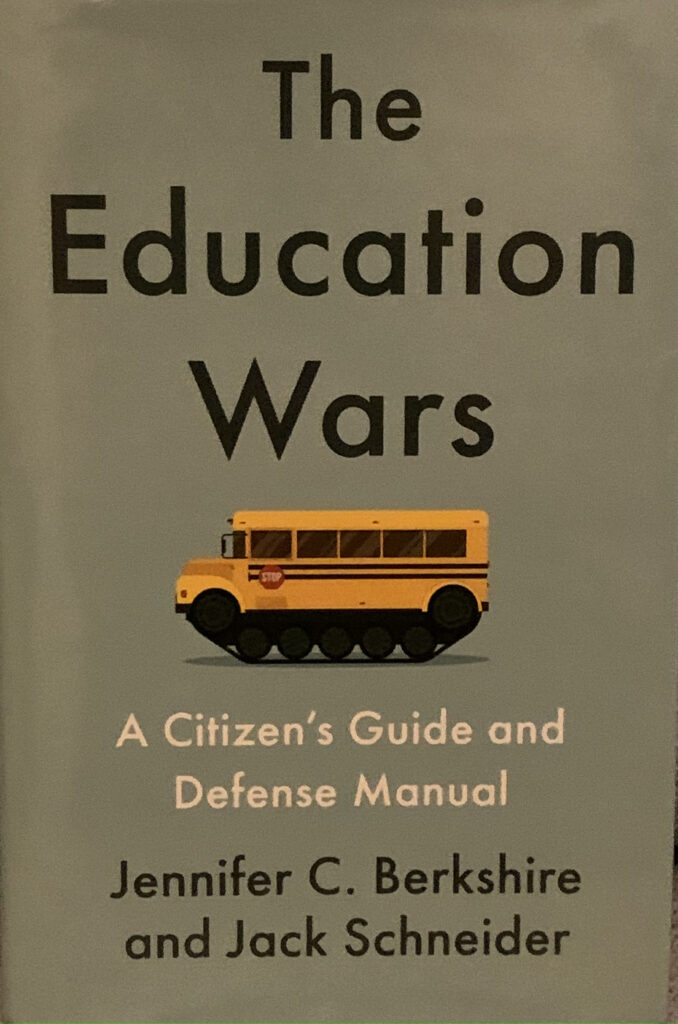“if we lose them, they won’t come back”

I just finished reading an advanced copy of Jennifer Berkshire and Jack Schneider’s new book “The Education Wars: A Citizen’s Guide and Defense Manual.” It is a must read for anyone who supports public education, questions book bans and/or wonders why school board meetings have become so contentious lately. The book can be pre-ordered now and is scheduled for release on July 2, 2024.
Jennifer Berkshire and Jack Schneider are the hosts of my favorite education-themed podcast, “Have You Heard,” and wrote the book “A Wolf at the School House Door,” in which they took a deep dive into the right wing’s push towards privatization and dismantling of public schools (not surprising, Florida plays a prominent role).
In “The Education Wars” they demonstrate how, while public schools have been the target of multiple culture wars before, today’s attacks put the very existence of public schools at risk by undermining America’s commitment to educating every child, no matter their circumstances. While loud, right-wing groups argue about Critical Race Theory, “gender ideology,” and pornography under the guise of “parental rights,” well funded free-market think tanks are taking advantage of the turmoil to rapidly advance their privatization agenda. The goal is not just to privatize public schools but to privatize the responsibility for public education entirely. If they succeed in doing so, tax-payers will begin to rebel against funding individual choices and ask why they are funding education at all. Public education, as we know it, will not survive.
Berkshire and Schneider don’t simply identify the participants and their motivations for the present attack on our public schools, they also share their ideas about what to do next: “The first steps, as we see it, is to begin making a stronger and clearer case for taxpayer-supported, open-enrollment, democratically controlled schools. Perhaps, not surprisingly, then we must spend a great deal of time in this book making a case for what public education can be. After all, if we’re going to fight for the future, we have to believe that it’s a future worth fighting for.”
Like it or not, education is on the ballot this fall. The time is now for those who support their local community’s schools to understand the existential threat currently facing America’s public education system. Reading “The Education Wars,” and sharing it with your friends and neighbors, is a good start.
Unfortunately, outrage and fear (especially about our children’s future) have been found to be effective strategies for galvanizing voters. Americans are now more likely to support or oppose particular education policies based on their political affiliations. The impact of such partisan policies (like “Fund Students Not Systems -see Chapter 6) on the future of their public schools may not be well understood by the local electorate. To retain America’s vision of a high quality system of free public schools, available to ALL children, it is essential that communities resist divisive partisan rhetoric so their public schools can retain their broad community support. We can’t not allow public education to become a partisan issue, supported by only half of Americans. The authors warn that defenders of public education “must take care not to further fan the (culture war) flames,” noting:
“Nobody can or will “win” the educational culture wars, because as a populace, we are simply too diverse and divided for that.
If we are to preserve our schools it must be clear that education is for all of us. We must win the peace.
If we fail at that, we will lose our schools. And if we lose them, they won’t come back.”
p.154. “The Education Wars: A Citizen’s Guide and Defense Manual”
Read the book. Share it. Help advance a vision of public schools that everyone can support.

Florida is now making it easier to convert public schools into charter schools. Previously an uncommon situation in the state, the FL DOE is changing the FL Admin Code to align with a recent charter conversion attempt in Alachua County. Without any parameters on the school outside of existing for two years, this will allow a fourth of the school’s parents with half of the school’s qualifying teachers to effectively take over a school.
Although I agree that the rule change is likely in response to the failed conversion vote in Newberry, the law the rule is based on (Fs 1002.33(3)(b), enacted in 2002), says “at least 50% of the the teachers and 50% of the parents”… so they are changing the rule to reflect the actual law. I don’t agree with the entire process of turning a community owned public school over to a privately managed charter school based on only a small percentage of the current teachers and attendees at the school, but any change will require a change in the law… and that will require a dramatic change in lawmakers.